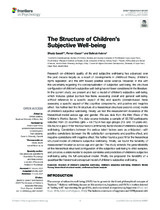The structure of children's subjective well-being

View/
Date
2021Author
Savahl, Shazly
Casas, Ferran
Adams, Sabirah
Metadata
Show full item recordAbstract
Research on children’s quality of life and subjective well-being has advanced over
the past decade largely as a result of developments in childhood theory, children’s
rights legislation, and the shift toward positive social science. However, in line with
the uncertainty regarding the conceptualization of subjective well-being, the structural
configuration of children’s subjective well-being has not been considered in the literature.
In the current study, we present and test a model of children’s subjective well-being,
which includes global (context-free items assessing overall and general well-being,
without reference to a specific aspect of life) and specific (domain-based items
assessing a specific aspect of life) cognitive components, and positive and negative
affect. We further test the fit structure of a hierarchical structural (second-order) model
of children’s subjective well-being. Finally, we test the measurement invariance of the
hierarchical model across age and gender. We use data from the third Wave of the
Children’s Worlds Survey.
